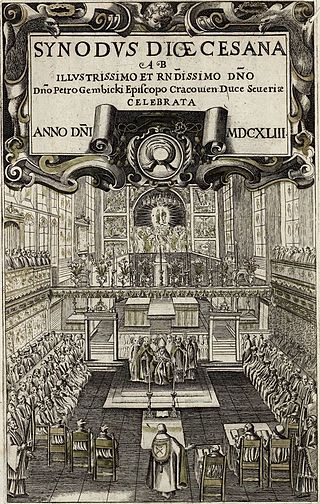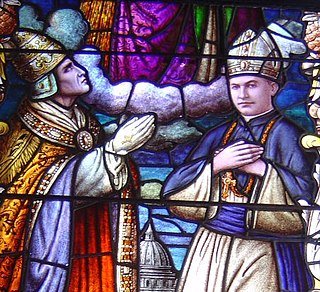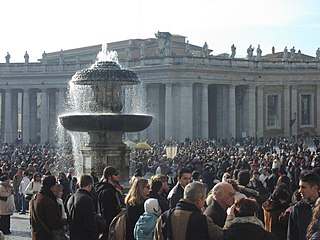In the canon law of the Roman Catholic Church, an administrator of ecclesiastical property is anyone charged with the care of church property.
 |
| Part of a series on the |
| Canon law of the Catholic Church |
|---|
| |
In the canon law of the Roman Catholic Church, an administrator of ecclesiastical property is anyone charged with the care of church property.
The supreme administrator and steward of to all ecclesiastical temporalities is the pope, in virtue of his primacy of governance. [1]
The pope's power in this connection is solely administrative, as he cannot be said properly to be the owner of goods belonging either to the Church or to particular churches. Papal administrative authority is exercised principally through the Congregations of the Roman Curia and similar bodies
The ordinary is to exercise vigilance over the administration of the property of the diocese, religious institute or other juridical bodies subject to him. [2]
What follows is taken from the 1913 Catholic Encyclopedia. With the coming into force of the Code of Canon Law in 1917 and its revision in 1983, the provisions of canon law have in some points been changed. What is here needs therefore to be rewritten either by an expert in canon law or by someone who has at his or her disposal the time required to extract the necessary information from canons 1273-1289 of the Code of Canon Law and sources such as this commentary on the Code of Canon Law
In each diocese the administration of property belongs primarily to the bishop, subject to the superior authority of the Holy See. From the beginning of the Church, this power has been a part of the episcopal office (can. 37, Can. Apost., Lib. II, cap. xxv, xxvii, xxxv. Const. Apost.). On him all inferior administrators depend, unless they have secured an exemption by law, as in the case of religious orders.
Therefore, if an arrangement exists by which the administration of certain diocesan or parish property is entrusted to some members of the clergy or to laymen, the discipline of the Church, nevertheless, maintains the bishop in supreme control with the right to direct and modify, if need be, the action taken by subordinate administrators.
One of the duties of a parish priest is the administration of the moneys and goods belonging to his church. The Third Plenary Council of Baltimore, Tit. IX, Cap. iii, gave detailed regulations concerning the manner in which a rector is to acquit himself of this obligation. Among other things, it is required that he shall keep an accurate record of receipts, expenditures, and debts; that he shall prepare an inventory containing a list of all things belonging to the church, of its income and financial obligations; that one copy of this inventory shall be deposited in the archives of the parish and another in the diocesan archives; that every year necessary changes shall be made in this inventory and signified to the chancellor. The authority of the parish priest is circumscribed by the general authority of the bishop and by special enactments which prevent him from taking any important step without the express written permission of the ordinary.
In many places lay people are called to a part in the care of church property, sometimes in recognition of particular acts of generosity, more often because their cooperation with the parish priest will be beneficial on account of their experience in temporal matters. Although the origin of the modern fabrica, or board of lay people, is placed by some in the fourteenth and by others in the sixteenth century, the Catholic Encyclopedia argues that it should be dated to as early as the seventh century, due to references in council documents.
Lay administrators remain completely subject to the bishop in the same manner as the parish priest. The difficulties caused by the pretensions of trustees in the United States during the early part of the nineteenth century evoked from the Holy See a reiteration of the doctrine of the Church regarding diocesan and parish administration notably in a brief of Gregory XVI (12 August 1841) wherein the Pope declared anew that the right of such inferior administrators depends entirely on the authority of the bishop, and that they can do only what the bishop has empowered them to do.
In some dioceses where the system of administration by lay trustees is in vogue the regulations and discipline of the Catholic Church are made a part of the bylaws of church corporations, a measure which is of advantage in case of a process before the secular courts.
The administration of property belonging to religious institutes under the jurisdiction of the ordinary rests naturally with their superiors, but the bishop may reserve to himself in the constitutions a large right of control and supervision. In reference to institutes under the jurisdiction of the Holy See, the bishop's right is limited to signing the report sent to Rome every third year by the superior.
Religious orders are exempt from diocesan control in the administration of their property, but are bound, when engaged in parochial work, to present to the bishop a report of the amounts they have received for parochial purposes, and of the use made of such contributions.
The exclusive rights of ecclesiastical authorities in the administration of church property have been denied in practice by civil authorities, in the past. Hence the care taken in various councils to admonish administrators to secure the titles to church property in accordance with the provisions of secular law, e.g. III Plen. Balt., no. 266.

A synod is a council of a Christian denomination, usually convened to decide an issue of doctrine, administration or application. The word synod comes from the Ancient Greek σύνοδος 'assembly, meeting'; the term is analogous with the Latin word concilium'council'. Originally, synods were meetings of bishops, and the word is still used in that sense in Catholicism, Oriental Orthodoxy and Eastern Orthodoxy. In modern usage, the word often refers to the governing body of a particular church, whether its members are meeting or not. It is also sometimes used to refer to a church that is governed by a synod.
A vicar is a representative, deputy or substitute; anyone acting "in the person of" or agent for a superior. Linguistically, vicar is cognate with the English prefix "vice", similarly meaning "deputy". It also refers to a senior priest in the Church of England. The title appears in a number of Christian ecclesiastical contexts, but also as an administrative title, or title modifier, in the Roman Empire. In addition, in the Holy Roman Empire, a local representative of the emperor, such as an archduke, could be styled "vicar".

A prelate is a high-ranking member of the Christian clergy who is an ordinary or who ranks in precedence with ordinaries. The word derives from the Latin praelatus, the past participle of praeferre, which means 'carry before', 'be set above or over' or 'prefer'; hence, a prelate is one set over others.
Canon is a Christian title usually used to refer to a member of certain bodies in subject to an ecclesiastical rule.

An ordinary is an officer of a church or civic authority who by reason of office has ordinary power to execute laws.
A vicar general is the principal deputy of the bishop or archbishop of a diocese or an archdiocese for the exercise of administrative authority and possesses the title of local ordinary. As vicar of the (arch)bishop, the vicar general exercises the (arch)bishop's ordinary executive power over the entire diocese and, thus, is the highest official in a diocese or other particular church after the diocesan bishop or his equivalent in canon law.
The hierarchy of the Catholic Church consists of its bishops, priests, and deacons. In the ecclesiological sense of the term, "hierarchy" strictly means the "holy ordering" of the church, the Body of Christ, so to respect the diversity of gifts and ministries necessary for genuine unity.
In Christianity, the term secular clergy refers to deacons and priests who are not monastics or otherwise members of religious life. Secular priests are priests who commit themselves to a certain geographical area and are ordained into the service of the residents of a diocese or equivalent church administrative region. That includes serving the everyday needs of the people in parishes, but their activities are not limited to that of their parish.
Incardination is the formal term in the Catholic Church for a clergyman being under a bishop or other ecclesiastical superior. It is also sometimes used to refer to laity who may transfer to another part of the church. Examples include transfers from the Western Latin Church to an Eastern Catholic Church or from a territorial diocese to one of the three personal ordinariates for former Anglicans.
In the Catholic Church, a canonical visitation is the act of an ecclesiastical superior who in the discharge of his office visits persons or places with a view to maintaining faith and discipline and of correcting abuses. A person delegated to carry out such a visitation is called a visitor. When, in exceptional circumstances, the Holy See delegates an apostolic visitor "to evaluate an ecclesiastical institute such as a seminary, diocese, or religious institute [...] to assist the institute in question to improve the way in which it carries out its function in the life of the Church," this is known as an apostolic visitation.
In the Catholic Church, fabrica ecclesiæ is a term meaning, etymologically, the construction of a church, but in a broader sense the funds necessary for such construction.

The Military Ordinariate of the Philippines is a Latin Church ecclesiastical jurisdiction or military ordinariate of the Catholic Church in the Philippines serving the Armed Forces of the Philippines, the Philippine National Police, and the Philippine Coast Guard.

In the Catholic Church, a bishop is an ordained minister who holds the fullness of the sacrament of holy orders and is responsible for teaching doctrine, governing Catholics in his jurisdiction, sanctifying the world and representing the Church. Catholics trace the origins of the office of bishop to the apostles, who it is believed were endowed with a special charism and office by the Holy Spirit at Pentecost. Catholics believe this special charism and office has been transmitted through an unbroken succession of bishops by the laying on of hands in the sacrament of holy orders.
The appointment of bishops in the Catholic Church is a complicated process. Outgoing bishops, neighbouring bishops, the faithful, the apostolic nuncio, various members of the Roman Curia, and the pope all have a role in the selection. The exact process varies based upon a number of factors, including whether the bishop is from the Latin Church or one of the Eastern Catholic Churches, the geographic location of the diocese, what office the candidate is being chosen to fill, and whether the candidate has previously been ordained to the episcopate.
Trusteeism and the trustee system are practices and institutions within certain parishes of the Catholic Church in the United States, under which laypersons participate in the administration of Ecclesiastical Property. When laypersons are among the trustees, the Church seeks agreement with the civil authorities to have the property administered under principles of canon law.
Precedence signifies the right to enjoy a prerogative of honor before other persons; for example, to have the most distinguished place in a procession, a ceremony, or an assembly, to have the right to express an opinion, cast a vote, or append a signature before others, to perform the most honorable offices.
The canonical situation of the Society of Saint Pius X (SSPX), a group founded in 1970 by Archbishop Marcel Lefebvre, is unresolved. The Society of Saint Pius X has been the subject of much controversy since 1988, when Bernard Fellay, Bernard Tissier de Mallerais, Richard Williamson and Alfonso de Galarreta were illicitly consecrated as bishops at Ecône, at the International Seminary of Saint Pius X, in violation of canon law. Lefebvre and the four other SSPX bishops individually incurred a disciplinary latae sententiae excommunication for this schismatic act. The excommunications of the four living SSPX bishops were remitted in 2009.
This is a glossary of terms used within the Catholic Church. Some terms used in everyday English have a different meaning in the context of the Catholic faith, including brother, confession, confirmation, exemption, faithful, father, ordinary, religious, sister, venerable, and vow.

Catholic laity are the ordinary members of the Catholic Church who are neither clergy nor recipients of Holy Orders or vowed to life in a religious order or congregation. Their mission, according to the Second Vatican Council, is to "sanctify the world".
A rector is, in an ecclesiastical sense, a cleric who functions as an administrative leader in some Christian denominations. In contrast, a vicar is also a cleric but functions as an assistant and representative of an administrative leader.